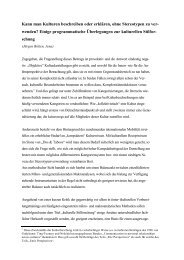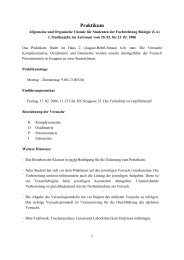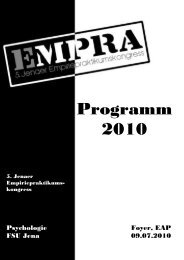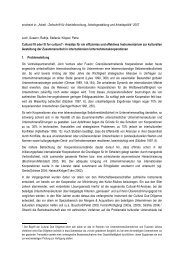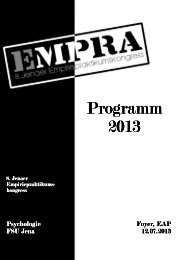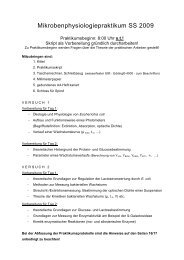Abstracts - Deutsche Zoologische Gesellschaft
Abstracts - Deutsche Zoologische Gesellschaft
Abstracts - Deutsche Zoologische Gesellschaft
You also want an ePaper? Increase the reach of your titles
YUMPU automatically turns print PDFs into web optimized ePapers that Google loves.
212 Zoological Systematics PostersP ZS.15 - ENTowards a global assessment of taxonomic needs and capacities: What taxonomists dowe need where?Swen Renner, Christoph HäuserStaatliches Museum für Naturkunde, StuttgartThe Global Taxonomic Initiative (GTI) is a cross-cutting theme of the UN Convention on BiologicalDiversity (CBD), and has asked in 2002 for national, regional and global assessments of taxonomicneeds and capacities (UNEP/CBD/COP6/Decision VI/8). Whereas several national and regional assessmentsof taxonomic needs and capacities have already been compiled, a global assessment isstill pending. As an important contribution for a global assessment, information about the currentstate of knowledge of national biodiversity and available taxonomic capacities is being compiled.The German GTI National Focal Point contributes to the global assessment by analyzing numbersof existing vs. needed taxonomists, and by assessing the species numbers per taxonomic group andcountry. The preliminary results indicate, not surprisingly, that existing taxonomic knowledge andresources are distributed unequally among countries and taxonomic groups. Whereas numbers oftaxonomists and the relative states of knowledge about their countries’ biodiversity are positivelycorrelated, numbers of taxonomists negatively correlate with the known or estimated species richnessper country. Especially tropical regions of Africa need more taxonomic expertise, as well asmany parts of SE Asia. Moreover, the state of knowledge of certain “unpopular” and not especiallyprominent groups such as micro-organisms, algae, fungi, and several invertebrate groups is regionallyas well as globally poor.P ZS.16 - EN454 pyrosequencing: large-scale phylogenomic approach of the scorpion PandinusimperatorFalko Roeding 1 , Michael Kube 2 , Richard Reinhardt 2 , Thorsten Burmester 11University of Hamburg; 2 Max Planck Institute for Molecular Genetics, BerlinThe utility of Expressed Sequence Tags (ESTs) for phylogenetic analyses has been shown, but commonlyused capillary electrophoresis sequencing techniques limit the throughput. An alternative,recently developed low-cost technique of emulsion DNA amplification and parallel pyrosequencing,increases the amount of raw data considerably. We present the results of an EST sequencing projectincluding the phylogenetic position of the Common Emporer Scorpion (Scorpionidae), a speciesfor which virtually no sequence data is available so far. The project yields in 439.432 sequencesassembled into 6.486 contigs and 160.207 singletons. A large number of sequences with orthologsin model organisms (identified via an extended BLAST search) shows the efficiency of this newtechnique and its potential use for large-scale phylogentic analyses.










